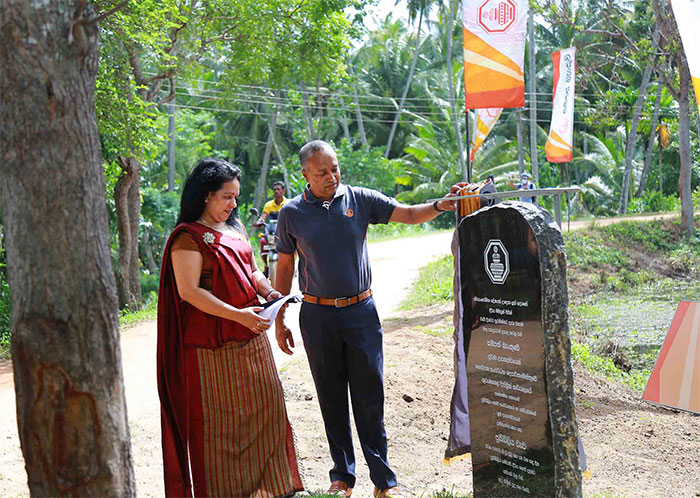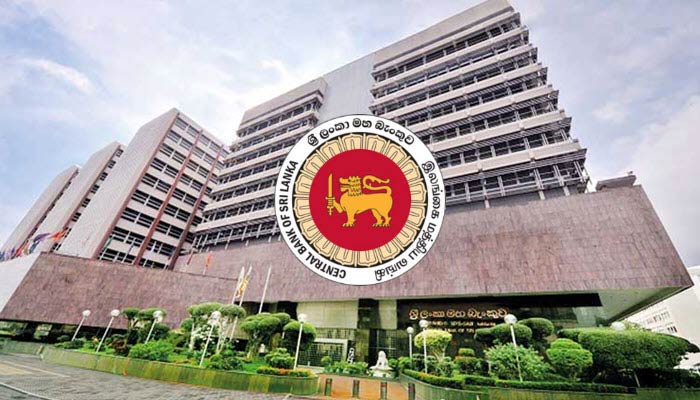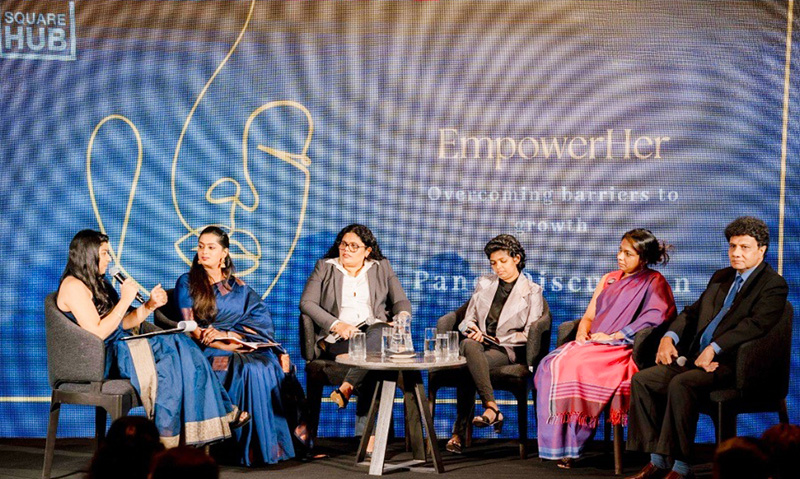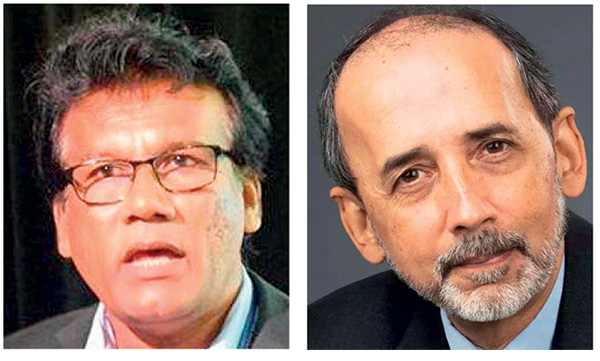Business
Sampath Bank hands over Pubbiliya Wewa, the 12th successful restoration project in its Wewata Jeewayak program

Sampath Bank recently handed over restored Pubbiliya Wewa, a 45-acre tank in Pubbiliya, Kurunegala District at a ceremony attended by bank officers, members of the executive committee of the local farmers association, villagers, and officials from the Department of Agrarian Development’s Kurunegala District Office. This project involved restoring the tank spill and removing layers of accumulated sludge that had built up over decades of neglect. Pubbiliya Wewa, located about six kilometers northeast of Kobeigane, will irrigate over 210 acres of prime paddy lands. Over 160 farming families, comprising of more than 500 men, women and children, stand to directly benefit. Additionally, the ripple effects of the restoration will bestow economic benefits on five neighboring villages as well.
The Pubbiliya Wewa Restoration Project is part of the ‘Wewata Jeewayak’ (Life to Tanks), Sampath Bank’s flagship Corporate Social Responsibility (CSR) initiative. Begun more than twenty years ago, ‘Wewata Jeewayak’ is a committed, coordinated effort to rebuild and restore the traditional irrigation network and thus ensure a dependable supply of water for dry zone farmers to cultivate their paddy lands and reap the harvests of both the Yala and Maha paddy seasons. ‘Wewata Jeewayak’ is congruent with what business schools call the triple bottom line. It’s a value system based on the belief that instead of focusing solely on their financial performance, firms should commit to measuring their social and environmental impact on the ‘Three Ps’- People, Planet and Profit as well. It’s aligned with the United Nations Sustainable Development Goals (UNSDGs). In a nutshell, to improve the livelihood of the community (People), increase the water capacity of the tank (Planet), enrich the surrounding ecosystem (Planet), contribute to the national GDP (Profit), and empowering local agricultural entrepreneurs (People and Profit).
At the handing-over ceremony, Sampath Bank officers thanked the Pubbiliya Govi Sanvidhanaya (farmers’ association) for their wholehearted contribution. The Bank also thanked the representatives of the Department of Agrarian Development’s Kurunegala District Office for their invaluable technical support.
“Restoring the Dry Zone’s water-dependent ecosystems mean that farmers can cultivate paddy in both the Yala and Maha seasons, and contribute to the nation’s food security. This is very much a topic of concern in the present day. Tank restoration enriches the country’s biodiversity profile as well, when regional fauna and flora start flourishing again. So, the benefits are truly multifold”, said Ajantha De Vas Gunasekera, Executive Director / Chief Financial Officer, Sampath Bank PLC.
“It’s very gratifying to see a bank taking an interest in the agricultural economy, and getting actively involved in restoring ancient tanks,” said Kiribandiya, President of the Pubbiliya Govi Sanvidanaya. “Speaking as farmers, we understand how important it is to make the country self-sufficient in food. Committed long-term efforts such as Sampath Bank’s Wewata Jeewayak program will help us accomplish that goal.”
Despite the obstacles currently faced by the banking sector in Sri Lanka, Sampath Bank has successfully maintained all its capital ratios well above regulatory requirements throughout Q1 2022. All the while, Sampath Bank has implemented all government-led moratorium schemes for eligible customer segments affected by the pandemic. The Bank’s digitalization strategy has also continued to prove its worth during these trying times by securing a more accessible and safer banking experience for customers.
Sampath Bank is a 100% local bank that has deeply rooted itself in the lives of the people of Sri Lanka. Established in 1987, the bank has become a state-of-the-art financial institution that continues to be a market leader today thanks to its constant innovation and customer focused approach to business. It has introduced many firsts to the Sri Lankan banking sector including introducing ATMs to Sri Lanka, extended banking hours, slip-less banking and adaptation of block-chain technology to name a few. As part of its visionary 2022 approach, the bank is steadily transforming itself into a ‘tech company engaged in banking,’ from the traditional approach of a bank adopting technology.
Business
Relief measures to assist affected Small and Medium Enterprises

As agreed with the Sri Lanka Banks’ Association (Guarantee) Ltd. (SLBA), to provide relief measures to affected SMEs by licensed commercial banks and licensed specialised banks, Circular No. 04 of 2024 dated 19.12.2024, and its addendum, Circular No. 01 of 2025 dated 01.01.2025 were issued by the Central Bank of Sri Lanka to ensure the effective implementation of the relief measures specified in the cited Circulars in a consistent manner across all licensed banks.
In case of any rejections or disputes, borrowers are requested to contact the respective banks and to appeal to the Director, Financial Consumer Relations Department of CBSL (FCRD), if required through the following channels:
Based on the repayment capacity and the submission of an acceptable business revival plan by the borrower, the relief measures extended to affected SMEs include rescheduling of credit facilities up to a period of 10 years, extending the time to commence repayments based on the capital outstanding, waiving off unpaid interest subject to conditions, and providing new working capital loans. Despite the availability of the above relief measures, limited number of borrowers had approached licensed banks to avail themselves of these benefits to date.
In addition to the above measures, with the gradual recovery of the economy, in order to facilitate the sustainable revival of businesses that were adversely affected during the recent past, several other measures were taken by CBSL together with the banking industry.
Accordingly, inter alia, strengthening the Post Covid 19 revival units of licensed banks, CBSL issued Circular No. 02 of 2024 dated 28.03.2024 on “Guidelines for the Establishment of Business Revival Units of Licensed Banks” mandating banks to establish Business Revival Units (BRUs) to assist viable businesses that are facing financial and operational difficulties.
Under BRUs, banks may provide support to viable businesses, such as restructuring and rescheduling of credit facilities including the adjustment of interest rates, maturity extensions, providing interim financing, advisory services etc., subject to the condition that such borrowers are required to submit acceptable business plans and feasible repayment plans. As reported by banks, by the end of 2024, around 6,000 facilities had been facilitated through these BRUs.
The above cited Circulars and Guidelines can be accessed via https://www.cbsl.gov.lk
Business
Visa commits to support women entrepreneurs in Sri Lanka

Visa (NYSE: V), the global leader in digital payments reiterated its support to women entrepreneurs across Sri Lanka as a part of its International Women’s Month celebrations across the world, by stating a firm commitment towards financial inclusion and digitization of women-led businesses, and hosted women from different walks of life in a specially curated event at Colombo.
Avanthi Colombage, Country Manager for Visa in Sri Lanka and Maldives stated, “At Visa, we believe in being the best way to pay and be paid by uplifting everyone, everywhere. This year, we celebrated International Women’s Month to support the very capable businesswomen in our country, with an event titled ‘Overcoming Barriers to Growth’ along with Square Hub, an incubator and business accelerator.”
The event by Visa brought together 35 upcoming women entrepreneurs across various sectors, including fashion, e-commerce, fintech, technology, manufacturing, and agriculture. While prominent industry experts shared views, learnings and experiences from their own journeys, the event also facilitated open discussions and networking among entrepreneurs, on how they can build and sustain thriving businesses.
Avanthi elaborates that Visa has built a firm foundation in supporting female entrepreneurship and the empowerment of women in Sri Lanka and understands the challenges women-owned businesses face when seeking capital, access, networks and guidance and continues to actively uplift women in Sri Lanka. Globally and in Sri Lanka, Visa believes that the participation of women is key to the growth of an economy. Avanthi adds, “Two years ago, when we celebrated 35 years of Visa in Sri Lanka, we announced a grant for The Asia Foundation to assist women-led small and medium businesses (SMBs) throughout the country. This initiative offered vital seed funding, skills training, and financial inclusion opportunities for women entrepreneurs, helping remove some major barriers to their success,” she recalled.
Business
Environmentalists renew concerns over Adani Group’s proposed Mannar wind power project

Environmental groups, including the Wildlife and Nature Protection Society (WNPS), the Centre for Environmental Justice (CEJ) and the Environmental Foundation Ltd. (EFL), are raising renewed concerns about the potential ecological impact of large-scale wind energy development on Mannar Island. Conservationists argue that the island, home to a unique and sensitive ecosystem, faces serious risks from industrial projects that may disrupt biodiversity and endanger local wildlife.
At the heart of the controversy is whether the environmental issues raised by Adani Group’s proposed wind energy project in Mannar were being adequately considered. Critics argue that tariff negotiations and economic interests overshadowed ecological assessments, potentially leading to a project that might compromise the island’s rich natural heritage.
“Can wind energy coexist with Mannar Island’s fragile ecosystem? asked environmental scientist Hemantha Withanage of the CEJ.
He told The Island Financial Review: “We must ensure that our transition to renewable energy does not come at the cost of irreplaceable biodiversity.”
Other conservationists have pointed out that environmentalists are often misrepresented as obstructionists in debates over development. “Are we being painted as enemies of progress, or is the public being misled about the real consequences of such projects? questioned Dr. Rohan Pethiyagoda, a leading environmental advocate.
With Adani’s possible withdrawal from the project, there is now an opportunity to reevaluate Sri Lanka’s approach to sustainable energy. Experts emphasize the need for a smarter, science-driven path that prioritizes both renewable energy and environmental conservation.
A joint media conference, scheduled for today at the Dutch Burgher Union, Colombo, aims to address these concerns. Organized by WNPS, CEJ, EFL and Pethiyagoda, the event will explore questions such as whether the project might resurface under a new guise and who the true beneficiaries of such large-scale energy initiatives are.
By Ifham Nizam
-

 Sports4 days ago
Sports4 days agoSri Lanka’s eternal search for the elusive all-rounder
-

 News3 days ago
News3 days agoBid to include genocide allegation against Sri Lanka in Canada’s school curriculum thwarted
-

 News5 days ago
News5 days agoGnanasara Thera urged to reveal masterminds behind Easter Sunday terror attacks
-

 Business6 days ago
Business6 days agoAIA Higher Education Scholarships Programme celebrating 30-year journey
-

 News4 days ago
News4 days agoComBank crowned Global Finance Best SME Bank in Sri Lanka for 3rd successive year
-

 Features4 days ago
Features4 days agoSanctions by The Unpunished
-

 Latest News2 days ago
Latest News2 days agoIPL 2025: Rookies Ashwani and Rickelton lead Mumbai Indians to first win
-

 Features4 days ago
Features4 days agoMore parliamentary giants I was privileged to know























